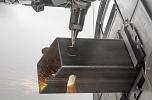Contributing Writer
- FMA
- The Fabricator
- FABTECH
- Canadian Metalworking
Categories
- Additive Manufacturing
- Aluminum Welding
- Arc Welding
- Assembly and Joining
- Automation and Robotics
- Bending and Forming
- Consumables
- Cutting and Weld Prep
- Electric Vehicles
- En Español
- Finishing
- Hydroforming
- Laser Cutting
- Laser Welding
- Machining
- Manufacturing Software
- Materials Handling
- Metals/Materials
- Oxyfuel Cutting
- Plasma Cutting
- Power Tools
- Punching and Other Holemaking
- Roll Forming
- Safety
- Sawing
- Shearing
- Shop Management
- Testing and Measuring
- Tube and Pipe Fabrication
- Tube and Pipe Production
- Waterjet Cutting
Industry Directory
Webcasts
Podcasts
FAB 40
Advertise
Subscribe
Account Login
Search
No substantiation, no deduction
If you don't have records, the IRS can't give you tax breaks
- By Mark Battersby
- August 15, 2002
- Article
- Shop Management
Fabricators should keep records carefully to avoid disallowed deductions and the ever-escalating amounts that add up until that lack of records, documentation, or supporting information is eventually discovered. U.S. tax law requires every person—defined as a taxpayer, a sole proprietor, a partnership or its partners, corporations, pass-through S corporations, and even limited liability companies—to keep records sufficient to establish their tax liabilities. Those laws do allow for reasonable deductions for operating expense. It falls on the taxpayer to prove that expenses are reasonable and ordinary. Attempts to establish or substantiate deductions after the Internal Revenue Service questions a return are usually fruitless.
According to the Internal Revenue Service (IRS), even though incidents of failure to file tax returns and cheating are increasing, the number of tax returns examined has declined dramatically in recent years.
So why worry about substantiating or documenting the expenses of your metal tube and pipe business?
Because you want to avoid disallowed deductions and the amount of taxes that continue to add up until that lack of records, documentation, or supporting information is eventually discovered.
Remember, under U.S. tax laws, a taxpayer is guilty until proven innocent. The IRS doesn't have to prove that a tube producer or fabricator is entitled to a tax deduction. The tube producer or fabricator must prove to the IRS's satisfaction that a tax-deductible expense was incurred.
A recent case before the U.S. Tax Court illustrates the expensive results that lack of substantiation can have.
In this situation, a small-business owner employed his brother. The businessman also had a firearms business, owned rental property, operated a limousine business, and was renovating a house to sell. He claimed various Schedule C expenses for the small business — expenses that were disallowed by the IRS.
When the dispute ended up before the U.S. Tax Court, the court considered those Schedule C expenses and allowed an even larger deduction for the costs of his telephone, advertising, and supplies. The court also considered car and truck expenses the businessman claimed but concluded that he had failed to maintain adequate records.
The court also considered the expenses claimed for maintaining a home office, concluding that the businessman used the space for both personal and business purposes and wasn't entitled to a home office deduction—even if he could substantiate the expenses claimed.
Adding insult to injury, the court disallowed his claim of casualty loss for the seizure and destruction of guns held for the firearms business, because he failed to substantiate the loss. And the court agreed with the IRS's imposition of adding a penalty to the tax for failure to file a timely return.
The Law on Records
Under U.S. tax laws, every person liable for any tax imposed must keep records, render statements, make returns, and comply with rules and regulations the IRS prescribes to show whether he or she is liable for tax.
Under the tax laws, a person is defined as a taxpayer, a sole proprietor, a partnership or its partners, a corporation, a pass-through S corporation, and even a limited liability company (LLC).
Tax regulations require that persons subject to income tax or required to file an income tax return must keep books or records, including inventory records, that can sufficiently establish the amount of gross income, deductions, and credits a return requires.
The rules also require that taxpayers keep these books and records available at all times for inspection by IRS officers and must retain them as long as their contents are subject to any Internal Revenue law.
Plus, an IRS ruling has established that the above rules include all computerized accounting records and should be retained as long as their contents are needed.
Reasonable Allowances
Offsetting all the must-do rules is the basic tax law that states, "There shall be allowed as a deduction all the ordinary and necessary expenses paid or incurred during the taxable year in carrying on any trade or business," including:
- A reasonable allowance for salaries or other compensation for personal services rendered.
- Traveling expenses (including those for meals and lodging that are not extravagant under the circumstances) while away from home in pursuit of trade or business.
- Rentals or other payments required to be made as a condition to continued use or possession of property for purposes of trade or business. This assumes the taxpayer has not taken or is not taking title of such property and has no equity in it.
Ordinary and Necessary
The tax law states that every metal tube and pipe business, whether operating as a sole proprietorship, corporation, partnership, or other business entity, may deduct the ordinary and necessary expenses of carrying on business.
Whether an expense is ordinary and necessary is based on the facts surrounding the expense, making the records and documentation backing up that deduction even more important.
An expense is necessary if it is appropriate and helpful to a taxpayer's business. An expense is ordinary if it is common to and accepted in the particular business activity.
For example, in the eyes of the IRS, a first-class plane fare for a plumber might not qualify as ordinary and necessary. Surprisingly, however, as long as that expense is properly documented, and if it can be proven to be necessary for business purposes, it will qualify as a deduction.
Of course, the IRS probably would seek to adjust the deduction to the equivalent of business class airfare.
Unfortunately, failing to substantiate legitimate business expenses is a widespread problem in many businesses, including tube and pipe manufacturing.
Substantiation After the Fact
Rarely does the legal process permit businesses to deduct business expenses after the fact; that is, after the tax return has been filed. In one recent situation, a taxpayer waited to claim additional expenses that would have reduced the tax bite — but not the penalties for failing to report income — until after he had been found guilty of failing to report all of his business income.
The 9th U.S. Circuit Court of Appeals ruled that a 50 percent partner in a metal fabricating business had failed to report all of the operation's sales and used company funds for personal expenses. Both the appeals court and an earlier U.S. Tax Court decision rejected the owner's claim that he had incurred additional business expenses that could be used to offset the unreported sales.
The appeals court dismissed the owner's argument that the earlier tax court decision had erroneously disallowed business expense deductions. However, when it establishes that a taxpayer received unreported income, the IRS presumes the offender included all expenses on the return.
The court dismissed the owner's claim that he could not produce evidence because of his inadequate books and records, noting that he had a duty to maintain sufficient records to establish deductions.
The fabricator also argued that he was entitled to a credit for the civil penalties imposed because of his failure to report all of his business's income and document additional business expenses.
However, the appeals court stated that, contrary to the owner's argument, civil and criminal penalties are not handed down to remedy a wrongdoing. Civil penalties reimburse the IRS for investigation expenses and protect revenue; criminal penalties, of course, are punitive.
Documenting expense deductions the IRS says must be substantiated can help businesses avoid such criminal and civil penalties. Failure to report taxable income, on the other hand, especially if it results from poor recordkeeping, is more difficult to explain away.
About the Author
About the Publication
subscribe now

The Tube and Pipe Journal became the first magazine dedicated to serving the metal tube and pipe industry in 1990. Today, it remains the only North American publication devoted to this industry, and it has become the most trusted source of information for tube and pipe professionals.
start your free subscription- Stay connected from anywhere

Easily access valuable industry resources now with full access to the digital edition of The Fabricator.

Easily access valuable industry resources now with full access to the digital edition of The Welder.

Easily access valuable industry resources now with full access to the digital edition of The Tube and Pipe Journal.
- Podcasting
- Podcast:
- The Fabricator Podcast
- Published:
- 04/16/2024
- Running Time:
- 63:29
In this episode of The Fabricator Podcast, Caleb Chamberlain, co-founder and CEO of OSH Cut, discusses his company’s...
- Trending Articles
Zekelman Industries to invest $120 million in Arkansas expansion

3D laser tube cutting system available in 3, 4, or 5 kW

Corrosion-inhibiting coating can be peeled off after use

Brushless copper tubing cutter adjusts to ODs up to 2-1/8 in.

HGG Profiling Equipment names area sales manager

- Industry Events
16th Annual Safety Conference
- April 30 - May 1, 2024
- Elgin,
Pipe and Tube Conference
- May 21 - 22, 2024
- Omaha, NE
World-Class Roll Forming Workshop
- June 5 - 6, 2024
- Louisville, KY
Advanced Laser Application Workshop
- June 25 - 27, 2024
- Novi, MI


























